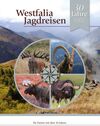Well prepared! Every hunting trip needs to be planned precisely - whether it's going to Poland, Africa, or the Arctic ...
How different the specifics of each trip may be, we can always recommend things that prove themselves in the run-up to each hunting trip.
Time management
As banal as it sounds, prepare all personal documents early enough. Check that your passport and identity card are valid for six months beyond the travel period. Make all necessary papers together:
• Passport / identity card (valid for at least 6 months)
• hunting license and firearms card (WBK)
• European firearms pass
• INF 3 form
• Africa: travel contract with address of farm / outfitters
• For Canada: "Non resident firearms declaration"
• For Alaska: ATF application (at least 6 weeks before the start of the hunt)
Health and Fitness
Depending on the destination is the expected physical and mental stress. Mountain hunts need e.g. a special level of preparation, because if you are not constantly in the mountains for hunting, you should definitely in the run-up intense physical training.
If the training is taken after a long period without exercise, a consultation of the family doctor is advisable. Increase your training so that you are able to master long stalking as well as ascents and descents just two weeks before you travel.
The better prepared you are to start the journey, the more you can enjoy it!
• Check your vaccination status early enough before the trip (recommendation of the Robert Koch Institute)
• In the case of Africa travel, it must always be assumed that you must protect yourself against malaria.
See your family doctor (prophylactics such as Malarone are well tolerated, but must be taken before you travel and until you return).
• When traveling to Cameroon, a yellow fever vaccination is required (otherwise the entry is denied).
Medicine
• Inform us and your outfitter if you have any health problems, so that we can deal with them early enough and take precautions.
• In addition to the medicines you need personally in your luggage:
Strong painkillers, sunscreen, diarrhea (immodium (etc.) and charcoal tablets for detoxification), blister plaster and an antihistamine.
Necessary insurance
• International health insurance
• International hunting license
• Baggage insurance (the value of rifle, optics etc. quickly exceeds the normal scope of insurance coverage).
Basically well dressed
Even with the clothes it proves to be appropriate to the conditions of the hunting land. Breathable materials in onion shell principle with active hunts, robust, simple cotton clothing in Africa, especially warm clothing for winter hunts.
Important is the underwear that ensures that sweat is carried away from the skin. Then you do not freeze when you take breaks or sit up after a march longer.
Always remember to bring change clothes so that soaked clothes can be changed to dry.
Of particular importance is the footwear for all active hunts. Whether it's a mountain shoe or a stalking boot in Africa: The shoes have to be well worn. Otherwise, bubbles threaten that make hunting extremely difficult.
Weapon and Ammunition
As far as the rifle, the caliber and the laboratory are concerned, this must be selected according to the game species and the hunting area. Basically, it is advisable to hunt with your own, familiar rifle. What is important in the first place is the clean shot.
If Africa is big game, the minimum caliber is .375 H & H.
Stronger calibers like .416 Remington or Rigby and beyond bring more power, but only if the rifle is safely mastered.
In mountain hunts, calibers are like .300 Win. Mag. Or 8x68S good universal calibers, which can basically be used on all game species.
Shooting:
Since stalking is often done abroad, you should practice shooting over the shooting range. An intuitive command of the shot on a tripod can make the difference at the crucial moment.
Optics:
In unknown terrain, especially during mountain hunting, it is often difficult to estimate the distance safely. A big advantage is, if you have a rangefinder with you. Such digital rangefinders are available, for example, in Leica and Swarovski branded glasses. You can observe and at the same time measure the distance - an invaluable advantage before the shot.
But even separate rangefinders do their job and prevent some missed shot, which results from a wrong distance estimation.










